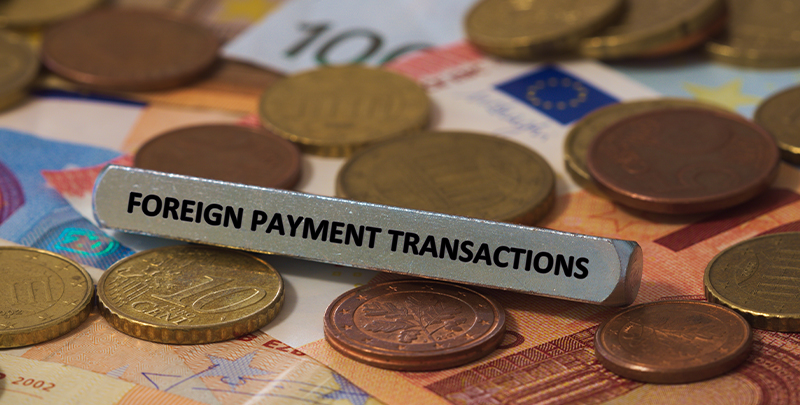- Accounts
- Digital Savings Account
- Savings Account
- Digital Salary Account
- Salary Account
- Digital Current Account
- Current Account
- Trust NGO Institutional Savings Account
- Safe Deposit Locker
- Safe Custody
- Pension Disbursement Account
- PMJDY
- Silver Linings Program
- Doctors Banking Program
- Young sparks program
- Self Employed Banking Program
- Deposits
- Cards
- Forex
Send Money AbroadSend Money to India
- Loans
24x7 Loan
- Investments
- Insurance
General InsuranceHealth Insurance
- Payments
- Offers & Rewards
- Learning Hub
- Bank Smart
- Open digital A/C
Explore 250+ banking services on Axis Mobile App
Scan to Download
- Current Account
- Pay
- Collect
- Trade
Services
Solution for Exporters
- Debt & Working Capital
24x7 Loans
For MSMEs with turnover up to ₹30 Cr
- Treasury
- Transact Digitally
- Home
- Blogs
- Credit Card Guide
- Foreign Transaction Fee On Credit Cards

Managing Credit
Understanding foreign transaction fees on Credit Cards
Imagine you are on a long-awaited trip abroad, enjoying the sights, shopping and experiencing the local cuisine. Every time you swipe your Credit Card, you think of the ease and security it provides. However, you might notice unexpected Credit Card international transaction charges on your statement later – these are likely Credit Card foreign transaction fees. Understand these additional costs and save yourself from surprises on your next adventure.
What is a foreign transaction fee?
A foreign transaction fee is an additional charge that your Credit Card issuer imposes when you make a purchase in a foreign currency or through a foreign bank. This fee typically covers the cost of converting the transaction from foreign currency to Indian Rupees, as well as any additional processing fees.
How much is a foreign transaction fee?
The amount of the foreign transaction fee on Credit Cards varies depending on the Credit Card issuer. Typically, this fee ranges from 1% to 3% of the transaction amount.
How to calculate foreign transaction fees
Foreign transaction fee = Purchase amount in ₹ × foreign transaction fee percentage Sample calculation:
1. Foreign purchase amount: USD 100
2. Exchange rate: 1 USD = ₹84
3. Converted amount in ₹: $100 * ₹84 = ₹8,400
4. Foreign transaction fee percentage: 3%
Foreign transaction fee calculation: ₹8,400×0.03 = ₹252
Transactions subject to foreign transaction fees
- Buying from international e-commerce sites incurs fees due to currency conversion and processing.
- Using your Credit Card at foreign ATMs results in a foreign transaction fee, plus any ATM fees.
- Services billed by companies outside India, such as streaming or software subscriptions, incur fees.
- Booking and paying with international companies can attract foreign transaction fees.
- Purchasing tickets directly from non-Indian airlines typically incurs fees.
- Payments through apps or digital wallets in foreign currencies are subject to these fees.
How to avoid foreign transaction fees
- Opt for Credit Cards that do not charge foreign transaction fees, as this will allow you to make international purchases without incurring additional costs.
- Always choose to pay in the local currency when given the option. This can help you avoid dynamic currency conversion fees, which are often higher than standard foreign transaction fees.
- Consider using prepaid travel cards, which allow you to load multiple currencies and spend abroad without transaction fees.
Other Charges Applicable to Credit Card Foreign Transactions
You might face various fees when using your Credit Card for international transactions.
- A common one is the currency conversion fee charged by network providers.
- Dynamic currency conversion (DCC) fees may also apply when a merchant offers to convert the charge into INR at checkout, often leading to higher rates.
- Cash advances from overseas ATMs may also incur extra charges and higher interest. Reviewing your card's terms helps clarify all potential fees before purchasing abroad.
Conclusion
Consider applying for an Axis Bank Credit Card when you travel abroad and enjoy offers and benefits such as accelerated reward points, cashback, discounts and so on.
Wrapping up
Understanding the foreign transaction fee on Credit Cards is crucial for managing your finances while travelling abroad.
Also Read: How to get a Credit Card without bank account? - 5 Easy steps
FAQs
Does a Credit Card charge international fees?
Yes, Credit Card companies apply international fees, often called foreign transaction fees. This fee accounts for currency conversion and handling costs on purchases made in foreign currencies or through non-domestic banks.
Can I avoid international transaction fees on a Credit Card?
Yes, you can ward off international transaction charges using a Credit Card that provides no foreign transaction fees, which many banks and travel Credit Cards offer. Alternatively, some digital wallets and multi-currency cards let you pay in local currencies without these fees, saving on conversion costs.
Can you use a Credit Card for international transactions?
Yes, most Credit Cards can be used for international transactions, but they must be globally accepted (like Visa or Mastercard). However, be watchful of foreign transaction fees and currency conversion rates. Informing your bank before travel can help avoid transaction issues and may enable security features for added protection.
How do I find out how much I have been charged on a foreign transaction?
You can check your Credit Card statement. The statement will typically list the original transaction amount, the conversion rate and the foreign transaction fee applied.
Is there a credit limit for international expenses?
Yes, your Credit Card’s credit limit applies to both domestic and international expenses.
Will finance charges be applicable if I do not pay the foreign transaction rate?
Yes, if you do not pay the full balance, including the Credit Card international fee, finance charges or interest will be applied to the remaining amount.
Will monetary instruments charge a mark-up fee on international transactions?
Yes, most Credit Cards and monetary instruments charge a mark-up fee on international transactions.
Disclaimer: This article is for information purpose only. The views expressed in this article are personal and do not necessarily constitute the views of Axis Bank Ltd. and its employees. Axis Bank Ltd. and/or the author shall not be responsible for any direct / indirect loss or liability incurred by the reader for taking any financial decisions based on the contents and information. Please consult your financial advisor before making any financial decision.
Table of Contents
Related Services
Learning Hub
Look through our knowledge section for helpful blogs and articles.
Jan 26, 2026
2 min read
618 Views
Tax saving hack: Section 80C Simplified
Technology has simplified personal finance at every turn, from cashless transactions to expense tracking and filing income tax returns....
Jan 26, 2026
4 min read
633 Views
Credit Utilisation Ratio: The number that shapes your credit score
Are you paying your bills on time, but still have to deal with a low credit score? The problem could be your...
Jan 26, 2026
5 min read
9.8k Views
Unable to make recurring payments via credit, debit cards?
Have you been getting a slew of notifications recently for recurring payments you had...
Jan 26, 2026
5 min read
459 Views
Avail lounge access and travel Insurance perks with Credit Card
As the festive season approaches, many people may be gearing up for travel. Whether visiting...














